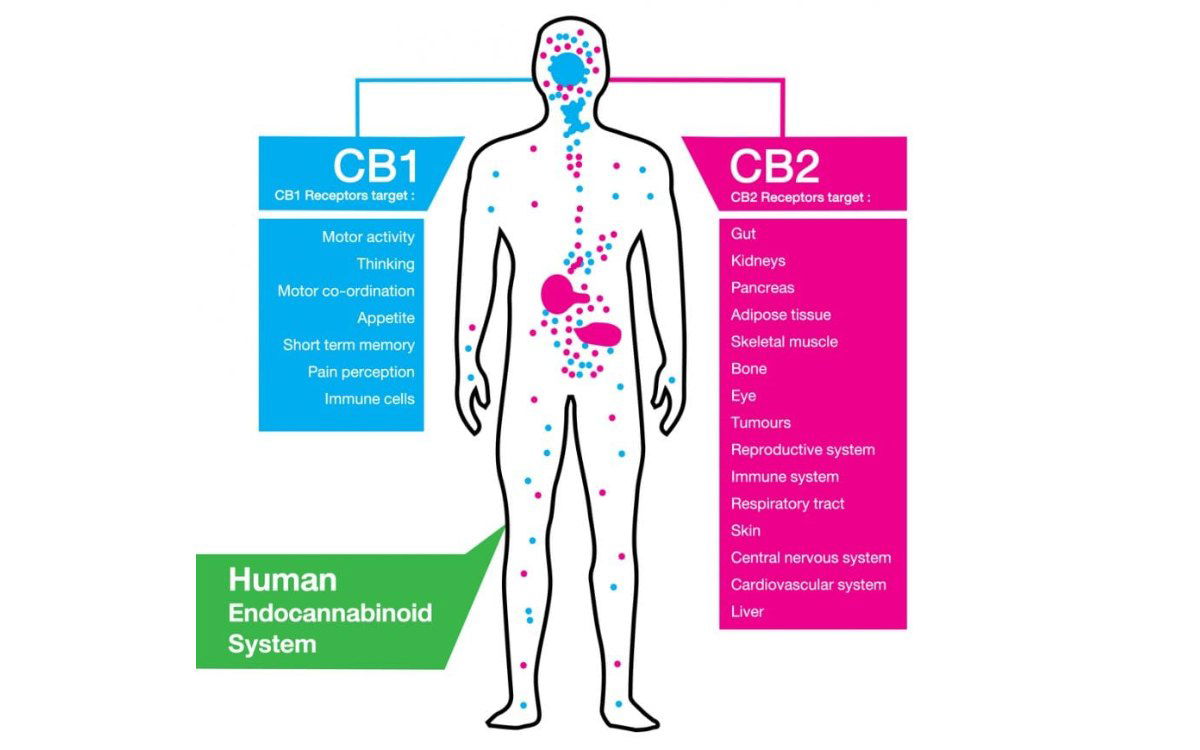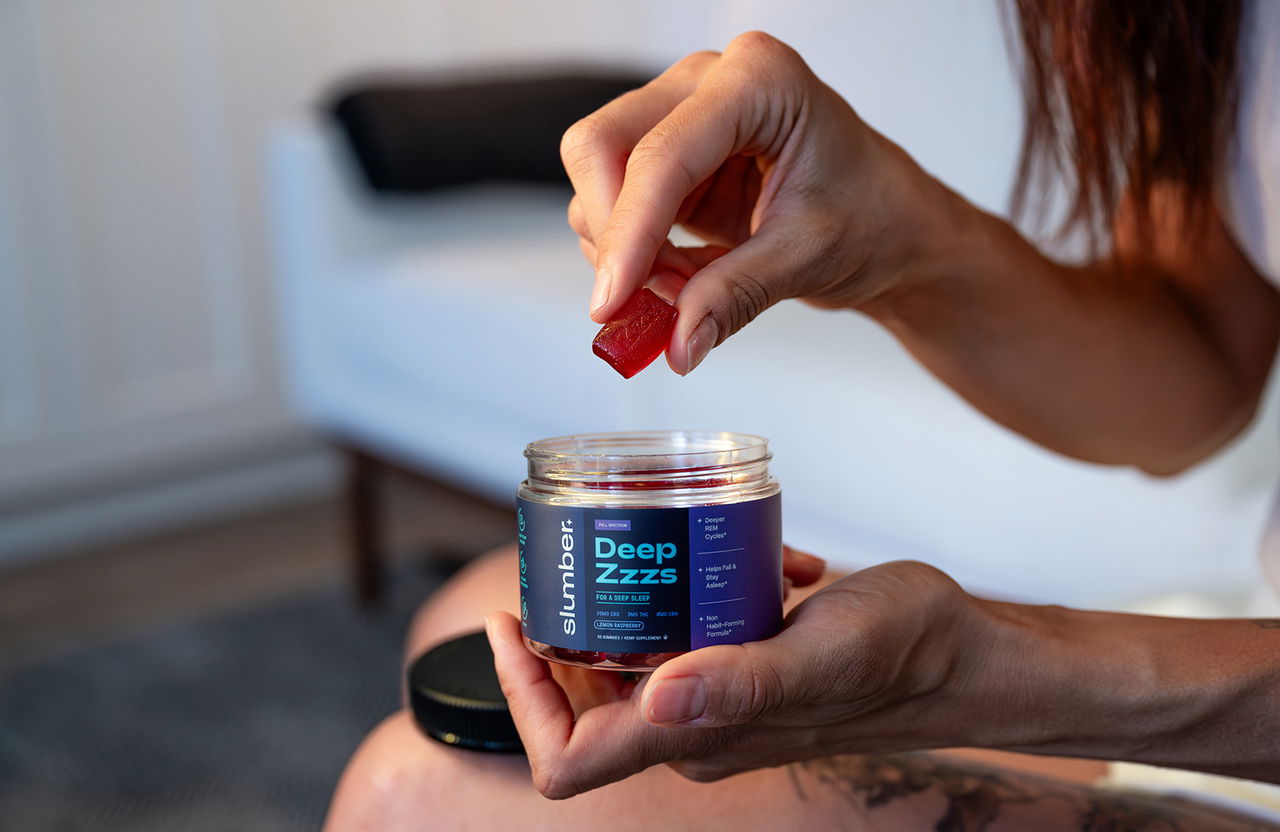Updated January 15, 2025
With sleep disorders affecting millions worldwide, many people are seeking non-pharmaceutical and natural, plant-based solutions to improve sleep quality without the side effects of traditional sleep aids. One promising option gaining attention and growing in research is using CBN for Sleep (Cannabinol).

Key Takeaways:
CBN is a natural compound from aging cannabis/hemp that aids sleep without significant psychoactive effects.
Works through the body's endocannabinoid system to promote deeper sleep, unlike melatonin which only regulates sleep cycles.
Often more effective when combined with CBD or THC (entourage effect). Slumber CBN Sleep Study shows up to 72 minutes of increased sleep per night.
Available as tinctures, gummies (convenient), or capsules (long-lasting), with recommended doses ranging from 5-30mg depending on needs.
CBN offers a non-habit forming alternative to prescription sleep aids and melatonin.*
With sleep disorders affecting millions worldwide, many people are seeking non-pharmaceutical and natural, plant-based solutions to improve sleep quality without the side effects of traditional sleep aids. One promising option gaining attention and growing in research is CBN (Cannabinol)—a lesser-known cannabinoid in the hemp and cannabis plant. CBN is emerging as a cannabinoid that may specifically support sleep, and it is the entire basis for Slumber’s lineup of best-selling CBN products for sleep. But what exactly is CBN, and why is it becoming a sought-after solution for sleep issues?
CBN is a naturally occurring compound found in aging, oxidized cannabis and hemp plants. Research suggests that CBN may have a mild sedative effect, making it ideal for those looking to improve sleep quality. According to studies published in Psychopharmacology and the British Journal of Pharmacology, CBN may work by interacting with the body’s endocannabinoid system, which plays a vital role in regulating functions like sleep, mood, and pain perception. When combined with other cannabinoids, such as THC, CBN’s potential to support sleep may be enhanced, as evidenced by the “entourage effect,” where multiple cannabinoids work synergistically to heighten their effects. Consider Slumber’s Deep Zzzs gummies for sleep which contain CBN, CBD, and THC to produce an entourage effect that was proven to increase sleep by 72 minutes per night in a sleep study!

Unlike melatonin, which primarily helps regulate sleep-wake cycles, CBN offers a unique pathway to potentially deeper, more restful sleep by influencing the body’s own sleep-inducing mechanisms as opposed to mimicking the body’s natural response systems like melatonin or other traditional sleep aids. Importantly, CBN allows users to experience sleep benefits without feeling 'high' or impaired.
As more people explore CBN for sleep, brands like Slumber are investing in products designed specifically for nighttime use, making it easier than ever to incorporate this natural cannabinoid into a sleep routine. In this article, we’ll delve deeper into the science of CBN for sleep, compare it with other sleep aids, and guide you in choosing the right CBN products to enhance your nightly rest.
CBN, or Cannabinol, is a naturally occurring cannabinoid derived from the aging process of THC in the cannabis plant. As THC oxidizes over time, it breaks down into CBN, creating a compound that is often praised for its unique properties, especially when it comes to sleep support. CBN allows users to experience calming effects without feeling 'high'. If a product produces a high feeling, such as THC, then the user can experience detrimental effects on their sleep as a result of a racing mind. CBN’s sedative effects help produce a restful state. Rather, the sedative effects of CBN should help improve one’s ability to fall asleep and stay asleep as shown in our very own at home sleep study.
Academic research into CBN for sleep has revealed promising findings about its interactions with the endocannabinoid system (ECS), a network in the body that helps regulate essential functions like mood, appetite, and sleep. According to a study published in the Journal of Psychopharmacology, CBN appears to bind to CB1 and CB2 receptors in the ECS, which may explain its potential to support relaxation and promote restful sleep.
Additionally, when combined with other cannabinoids, CBN can produce the "entourage effect," a phenomenon where multiple cannabinoids work together to enhance each other's effects. This effect has been observed to further amplify CBN’s sleep-inducing properties, and the thought is that the effect is greater when the entourage effect is occurring as compared to cannabinoids operating on their own. Although, many Slumber customers report that CBN gummies featuring CBN isolate without other cannabinoids has helped improve their sleep quality, too!
CBN is distinct from other cannabinoids commonly used for wellness, such as CBD and THC. While CBD is known for its anti-anxiety and anti-inflammatory benefits, CBN’s primary appeal lies in its potential as a natural sleep aid. Unlike melatonin or synthetic sleep medications, CBN for sleep may offer a gentler, non-habit-forming solution for those struggling with sleep disturbances.
Given its emerging role as a sleep aid, CBN has become a key ingredient in products aimed at improving sleep quality, and brands like Slumber are leading the way by offering high-quality, CBN-focused formulations designed to support a peaceful night's sleep. As interest in natural sleep solutions continues to grow, CBN presents a unique, research-backed option for those seeking rest and relaxation through natural means.

Cannabinol is gaining interest for its potential role in sleep support. It works primarily through interactions with the endocannabinoid system (ECS) - a complex regulatory system present throughout the body that influences sleep, mood, immune function, and more. Although research on CBN is still emerging, preliminary findings suggest that CBN may impact sleep quality through multiple pathways, including its influence on cannabinoid receptors, interactions with other neurotransmitter systems, and its unique combination with other cannabinoids.
The ECS comprises three main components: endocannabinoids (cannabinoids naturally produced by the body), cannabinoid receptors (CB1 and CB2), and enzymes that break down cannabinoids. CBN, like other cannabinoids, interacts with this system to produce benefits for sleep that we are beginning to understand better as research advances. And although more research is needed to validate the efficacy of CBN in all adults, the preliminary research within academia as well as research championed by brands like Slumber is helping us better understand the power of CBN for sleep. Let’s first explore the ECS interaction:
CB1 and CB2 Receptors: The ECS receptors CB1 and CB2 are involved in various regulatory processes. CB1 receptors, found mainly in the brain, influence mood, memory, and sleep. CB2 receptors are located primarily in the immune system but also play a role in pain perception and inflammation. Although CBN binds only weakly to these receptors, research suggests it may have indirect effects, particularly on CB2 receptors, which could help reduce inflammation and discomfort that may interfere with sleep (source: Journal of Clinical Investigation).
Modulation of Sleep Cycles: By influencing the ECS, CBN may help regulate the body's sleep-wake cycle. The ECS plays a critical role in maintaining homeostasis, or balance, in the body. In a study published in Current Neuropharmacology, researchers found that the ECS is involved in sleep modulation, especially REM sleep, which is crucial for mental restoration. CBN’s mild interaction with the ECS could contribute to a more stable and restful sleep pattern.

Image from Hemp Edification
Beyond its impact on the ECS, CBN also appears to influence gamma-aminobutyric acid (GABA) receptors. GABA is a neurotransmitter that helps promote relaxation and reduce neuronal excitability, making it a key player in promoting sleep.
GABAergic Effects: Research in Phytomedicine indicates that CBN may enhance the activity of GABA receptors, similar to the way benzodiazepines (common sleep medications) work but without the same level of dependency risk. By enhancing GABAergic effects, CBN may help slow brain activity, encouraging relaxation and reducing anxiety, which are critical for initiating and maintaining sleep.
Sedative Potential: A study conducted in 1975 by Psychopharmacology found that CBN had mild sedative effects when combined with THC. This study is often referenced when discussing CBN’s potential for sleep aid, though more recent research is necessary to confirm its standalone sedative potential.
For those whose sleep is disrupted by chronic pain or inflammation, CBN's potential anti-inflammatory and analgesic properties could offer further benefits.
Pain Relief: In studies published in Frontiers in Pharmacology, cannabinoids, including CBN, were observed to have analgesic properties, potentially by activating CB2 receptors that reduce inflammatory responses. For individuals experiencing physical discomfort, CBN may alleviate pain, helping them to fall asleep more easily and stay asleep throughout the night.
Anti-Inflammatory Effects: In animal studies, CBN has been shown to reduce inflammation, potentially making it beneficial for individuals with conditions like arthritis or inflammatory disorders that may disrupt sleep. By reducing systemic inflammation, CBN might contribute to an overall sense of comfort, aiding in a smoother transition into sleep.
CBN’s effects are often enhanced when it is combined with other cannabinoids, creating what is known as the entourage effect. This synergy, especially with CBD or small amounts of THC, may amplify its sleep-supportive properties.
CBD and CBN: When combined, CBD and CBN may help reduce anxiety, a common cause of sleep disturbances, while providing additional relaxation benefits. Research in Frontiers in Neuroscience suggests that CBD can modulate the sedative properties of CBN, enhancing its overall effectiveness as a sleep aid.
THC and CBN: Although THC is psychoactive, low doses combined with CBN may boost sedative effects without creating an overwhelming psychoactive experience. The combined use of CBN and low-dose THC was shown to have stronger sedative effects than either compound alone, according to a study in Psychopharmacology. However, this effect depends on individual tolerance and the specific ratios used.
While the mechanisms of CBN in the ECS and GABAergic systems contribute to sleep onset, there is also evidence suggesting that CBN may support deep, restorative sleep by reducing the time spent in lighter stages of sleep.
Improving Sleep Quality: Preliminary research in the Journal of Cannabis Research found that cannabinoids, including CBN, may help improve time spent in deep sleep stages, particularly stages 3 and 4, which are critical for physical recovery and memory consolidation. This could mean that CBN not only helps users fall asleep but may also improve sleep quality, leading to better overall rest.
CBN’s interaction with the ECS, its GABAergic effects, anti-inflammatory properties, and potential synergy with other cannabinoids all contribute to its promising role as a sleep aid. Although more clinical research is necessary to fully understand the scope of CBN for sleep, existing studies suggest that it may support sleep by promoting relaxation, alleviating discomfort, and enhancing the body’s natural ability to transition into and maintain a restful state. With these benefits, CBN stands as a compelling natural alternative for those seeking to improve sleep quality without the side effects associated with traditional sleep medications.
When it comes to improving sleep, consumers have a range of options, including CBN (Cannabinol), CBD (Cannabidiol), melatonin, and prescription sleep medications. Each works through different mechanisms in the body, from naturally supporting the body’s sleep processes to artificially inducing sleep. We explore CBD vs CBN in this comprehensive guide as both are cannabinoids with slightly different effects on the body. Among the options for sleep aids, CBN stands out due to its natural interaction with the body's regulatory systems, offering sleep support without "tricking" the body into sleep or risking dependency.

Mechanism of Action: CBN works primarily by interacting with the endocannabinoid system (ECS), which plays a key role in regulating sleep, mood, and other vital functions. CBN binds to cannabinoid receptors (CB1 and CB2), particularly CB2, which influences relaxation, pain relief, and anti-inflammatory responses. By subtly modulating the ECS, CBN may help regulate sleep cycles in a balanced, natural way.
Benefits: CBN’s ability to promote sleep stems from its mild sedative properties and its potential to reduce anxiety and physical discomfort, factors that often disrupt sleep. Additionally, CBN has been shown to enhance the effects of other cannabinoids, like CBD or low doses of THC, creating a synergy known as the “entourage effect,” which can further improve sleep quality.
Positioning: Unlike melatonin or prescription drugs, which can disrupt the body’s natural sleep-wake cycle, CBN supports the body’s internal systems to achieve restful sleep without “forcing” sleep or creating dependency.
Mechanism of Action: CBD primarily interacts with the ECS but does so indirectly, enhancing the activity of endocannabinoids rather than directly binding to CB1 or CB2 receptors. Research indicates that CBD can reduce anxiety and improve relaxation, which indirectly supports sleep by calming the mind and body (source: Current Neuropharmacology).
Benefits: CBD may be beneficial for individuals whose sleep issues stem from anxiety or stress. Studies have found that CBD helps regulate cortisol levels, potentially leading to improved sleep quality. However, CBD on its own doesn’t have direct sedative properties, and its effects can vary greatly depending on dosage.
Positioning: CBD is more of a calming agent than a direct sleep aid. While it may help users unwind, it lacks CBN’s targeted action on sleep cycles and may be more effective as a supplementary aid for sleep rather than a primary solution.

Mechanism of Action: Melatonin is a hormone naturally produced by the pineal gland that signals the body when it’s time to sleep. Melatonin supplements are synthetic versions of this hormone, and when taken, they mimic the natural rise of melatonin in the evening, effectively “tricking” the body into believing it’s ready for sleep.
Benefits: Melatonin can be helpful for adjusting sleep patterns, especially for those with circadian rhythm disorders, jet lag, or shift work-related sleep issues. It works quickly, with effects felt within 30 minutes to an hour, and is widely available as an over-the-counter supplement.
Drawbacks: Unlike CBN, melatonin supplements do not address the root causes of sleep issues, such as anxiety or physical discomfort. Regular use of melatonin can also interfere with the body’s natural melatonin production, leading to potential dependency or diminished effectiveness over time. Additionally, melatonin can cause grogginess upon waking, especially in higher doses.
Positioning: While melatonin is effective for occasional sleep disruptions, CBN offers a more comprehensive approach by naturally interacting with the body’s sleep-regulating systems without the risk of interfering with hormone balance or causing dependency.
Mechanism of Action: Prescription sleep medications, such as benzodiazepines (e.g., Valium), non-benzodiazepine sedatives (e.g., Ambien), and certain antidepressants, work by directly depressing the central nervous system. Benzodiazepines increase the action of gamma-aminobutyric acid (GABA), a neurotransmitter that induces sedation and relaxation. Non-benzodiazepine “Z-drugs” like Ambien also target GABA receptors to initiate sleep.
Benefits: Prescription sleep aids can be highly effective for people with severe insomnia or those who need immediate relief from sleep disturbances. They generally work quickly, and their effects are strong and reliable.
Drawbacks: Prescription sleep drugs carry significant risks, including dependency, tolerance, and a range of side effects, such as grogginess, memory impairment, and even sleepwalking. These medications often alter sleep architecture, reducing time spent in restorative deep and REM sleep, which can impact overall sleep quality and lead to less restorative rest in the long term (source: American Journal of Psychiatry).
Positioning: CBN provides a gentle, non-habit-forming alternative to prescription medications. While not as potent, CBN promotes natural sleep without altering brain chemistry or creating dependency, making it a safer choice for long-term use.
CBN offers a unique advantage over these other sleep aids by working in harmony with the body’s natural systems rather than overriding or disrupting them. Here’s a recap of why CBN may be considered a superior option:
Natural Modulation: CBN works with the body’s endocannabinoid system, subtly supporting relaxation and natural sleep cycles without artificially inducing sleep. Unlike melatonin or prescription drugs, which can override the body’s natural rhythms, CBN allows the body to enter sleep states on its own, resulting in a more balanced and restorative sleep experience.
Gentle Sedative Properties Without Dependency: CBN has mild sedative effects that do not lead to dependency or tolerance, which can be a problem with both melatonin and prescription drugs. This makes it an ideal option for long-term use and a natural fit for individuals seeking gentle sleep support.
Comprehensive Relief for Sleep-Disrupting Factors: Unlike melatonin, which only addresses circadian rhythm, or CBD, which is primarily calming, CBN combines elements of relaxation, pain relief, and mild sedation. This makes it particularly beneficial for those dealing with multiple sleep barriers, such as pain, anxiety, or restlessness.
Entourage Effect with Other Cannabinoids: When paired with CBD or small amounts of THC, CBN’s effectiveness is amplified through the entourage effect, providing enhanced sleep support that’s still rooted in natural, plant-based compounds. This synergy is unmatched by single-compound sleep aids like melatonin or prescription drugs.
CBN for sleep is a holistic, natural approach that supports the body’s own sleep processes rather than imposing an artificial rhythm. This makes it especially appealing for those seeking a non-habit-forming, effective solution for sleep that respects the body’s natural sleep-wake cycles.
Choosing the right CBN product for sleep is essential to maximize its benefits. With various forms and dosages available, each product offers unique advantages, making it important to match your specific needs with the product’s features. Here, we’ll break down the most popular forms of CBN for sleep, provide key considerations for choosing a product, and highlight recommended options from Slumber, a trusted leader in high-quality CBN sleep products.
When selecting a CBN product for sleep, consider a few key factors: product type, delivery method, dosage, ingredients, purity, and quality. Below we dive a little deeper into each:
Product Type and Delivery Method: CBN products come in several forms, including tinctures, capsules, gummies, and even topicals. Each form has a different absorption rate, which can impact how quickly you feel the effects.
Dosage: The optimal CBN dosage varies depending on factors like body weight, metabolism, and the severity of sleep issues. Most beginners should start with a lower dose, gradually increasing as needed.
Additional Ingredients: Some CBN products are combined with other sleep-supporting ingredients like CBD, melatonin, or botanical extracts. These blends can enhance the effectiveness of CBN but should align with your specific needs and preferences.
Purity and Quality: Choose a reputable brand that provides third-party lab testing to ensure the purity, potency, and safety of their products. Slumber CBN is known for its transparency and high standards, making it a reliable choice for CBN sleep solutions.
When starting with CBN, it’s best to follow a “low and slow” approach. Start with the minimum effective dose, gradually increasing until you reach the desired effect. Here are general dosage guidelines for different levels of sleep support:
Mild Sleep Support: 5–10 mg of CBN, recommended for users who occasionally have trouble sleeping.
Moderate Sleep Support: 10–15 mg of CBN, suitable for those with moderate sleep disturbances.
High Sleep Support: 15–30 mg of CBN, intended for individuals with severe or chronic sleep issues.
Slumber provides detailed dosage instructions for each of its products along with an in-depth CBN Dosage Guide, making it easier to tailor your intake to your specific needs.
Consistency is Key: Like many natural supplements, CBN may work best when used consistently over time. Try to take your chosen CBN product at the same time each evening to help your body establish a routine.
Set the Right Environment: CBN works best when paired with a calming nighttime routine. Reduce screen time, dim the lights, and create a quiet, comfortable space to optimize your body’s response to CBN.
Be Patient: While some users report immediate effects, it may take a few days to a week for others to experience the full benefits of CBN for sleep. Consistency and patience can make a significant difference.
Here’s a breakdown of the most common types of CBN products available for sleep, along with top recommendations from Slumber CBN

Description: CBN tinctures are liquid extracts that are typically administered under the tongue for fast absorption. Tinctures allow for flexible dosing, making it easy to adjust based on personal preference.
Recommended Product: Slumber CBN Tincture for Sleep This tincture contains 300 mg of pure CBN per bottle, providing a concentrated dose that can be adjusted for individual needs. It’s a simple, clean option with no additives, appealing to those who prefer a straightforward, pure CBN experience.
Advantages: Tinctures are fast-acting and ideal for those seeking quick relief before bedtime. The dropper allows for precise dosing, and effects are typically felt within 15–30 minutes.
Description: CBN gummies are edible, pre-dosed options that offer a convenient and tasty way to consume CBN. These are especially popular among users who prefer a less medicinal experience.
Recommended Product: Slumber CBN Gummies with 15 mg CBN Each gummy contains 15 mg of CBN, a moderate dose that’s ideal for most users. Made with a delicious blueberry flavor, these gummies are vegan, gluten-free, and free of artificial colors, making them a clean and enjoyable choice.
Advantages: Gummies are easy to use and provide consistent dosing, making them ideal for those new to CBN. However, gummies take longer to take effect (about 30–60 minutes) due to the digestive process, so they’re best taken 1–2 hours before bed.
Description: CBN capsules offer pre-measured doses in an easy-to-take format, making them perfect for on-the-go use. Capsules are also tasteless, which is ideal for users who don’t like the taste of tinctures or edibles.
Recommended Product: Slumber CBN Sleep Aid Capsules These capsules utilize high quality CBN creating a powerful product for those with sleep issues or irregular sleep schedules.
Advantages: Capsules provide precise dosing and convenience, as well as a longer duration of effects. They are slower-acting than tinctures but typically last longer, making them suitable for those who experience frequent nighttime wake-ups.
Description: Many CBN products are formulated with additional sleep-promoting ingredients like CBD and melatonin. CBD may enhance relaxation and reduce anxiety, while melatonin is known for supporting the body’s sleep-wake cycle.
Recommended Product: Slumber CBN + CBD Oil for Sleep This tincture combines 300 mg of CBN with 600 mg of CBD, offering a balanced formula that supports relaxation while enhancing CBN’s sleep-promoting effects. Ideal for individuals who experience sleep disruptions due to anxiety or stress.
Advantages: Blends can provide a well-rounded sleep solution, addressing multiple aspects of sleep disturbances. This makes them particularly useful for those dealing with anxiety or irregular sleep patterns.
As research continues to validate CBN's potential as a natural sleep aid, it stands out as a promising alternative for those seeking better sleep quality. Unlike traditional sleep medications or supplements that can create dependency, CBN works harmoniously with your body's endocannabinoid system to promote natural, restorative sleep patterns.
Whether you choose CBN tinctures for rapid relief, convenient gummies for consistent dosing, or long-lasting capsules for sustained support, the key is finding the right product and dosage for your unique needs. Starting with a lower dose of 5-10mg and gradually adjusting based on your response can help optimize your results.
Remember that while CBN shows significant promise, it's part of a broader approach to healthy sleep. Combining CBN supplementation with good sleep hygiene practices and a consistent bedtime routine can maximize its effectiveness. As with any sleep aid, consult with a healthcare provider, especially if you have existing medical conditions or take other medications.
With growing scientific evidence supporting its benefits and an excellent safety profile, CBN represents an exciting development in natural sleep solutions. As we continue to understand more about this remarkable cannabinoid, its role in promoting healthy, restorative sleep becomes increasingly clear.